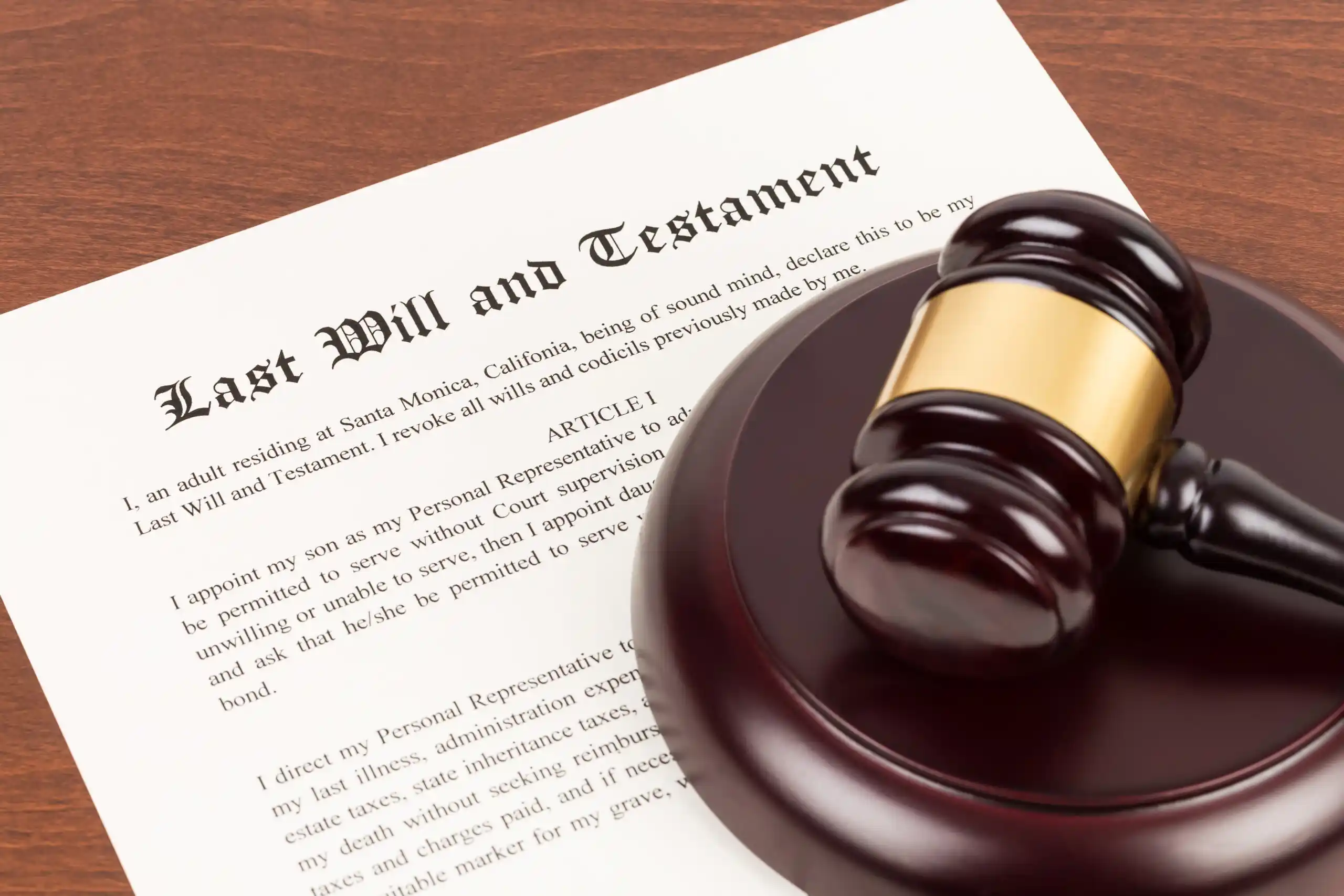Creating a last will and testament is important for every adult. It doesn’t matter whether you’ve accumulated many assets, or barely own anything. A will is especially important if you have children, and extremely important if they are still minors. However, studies repeatedly show that less than half of people have a will of any kind. Not having a will can cause plenty of headaches if you pass away unexpectedly.
Dying with a will is known as being intestate. The result is that any assets you have will fall under the “intestacy laws” of the state where you live. The state government will then determine how your property is distributed after your death. This includes any bank accounts, securities, real estate, cash, or other assets you own. Family and friends could end up inheriting nothing. To avoid this happening, you absolutely need to take the time to craft a will. However, there are plenty of mistakes that people make when writing a will. Here are some of the worst offenders that you should avoid.
Not Using a Professional
Let’s get this out of the way from the start. Creating a will is no trivial task. There are plenty of important legal considerations, including the laws of whatever jurisdiction you live in. For these reasons alone, we always recommend that you use a legal professional to help you create your will. They will know exactly what the relevant inheritance, probate, or tax laws are.
Yes, you can use one of those “Do-It-Yourself Will Kits” you see advertised online. They are technically legal. However, critics point out that they are often insufficient. The fill-in-the-blanks templates is too open to holes or misinterpretations. Paying a lawyer to do your will should only cost a few hundred dollars. Maybe up to $1,000, if you have a complicated financial situation. It’s well worth the expense to make sure your will is properly (and legally) done. Making period revisions (more on that later) will cost even less, since the majority of the will is already in place.
Not Appointing An Executor
An executor is a very important role. They are the person who acts as your personal representative after you pass away. The will placed in charge of handling your estate and carrying out your final wishes. The person you choose to be your executor must be trustworthy and reliable. Whether you’re picking a spouse, child, sibling, or friend (or another relative), make sure you choose wisely. You want the person to be honest, trustworthy, and organized. Being an executor of an estate brings a lot of paperwork, so make sure you choose someone responsible enough to handle it all.
Oddly enough, many people who prepare their own wills fail to name any executor. Failure to appoint an executor could result in your will ending up in court. That leaves it open to being interpreted by a judge or other legal professional. Avoid this pitfall by naming an executor. More importantly, talk to this person ahead of time. Make sure your preferred choice is willing to accept the role and carry out your wishes.
Finally, let them know where to find important documents. That obviously includes your will, but also things like insurance policies, online account passwords, and real estate or investment documents. Choose a good executor and then do everything you can to make their future duties as easy as possible.
Not Signing And Dating A Will Properly
This sounds so obvious. And yet, we have to list it. A surprising number of wills end up contested in court because the person who made the will did not date and sign the document properly. Unless properly dated and signed, a will cannot be considered a legal document. Keep in mind that your signature is not the only one required. One or more witnesses may also be required to sign in order to make it official.
Once the will is properly signed and dated, it should be notarized by a lawyer. A copy of the will should remain with the lawyer who prepared and/or notarized it. Failing to take these necessary steps could lead to a will being nullified in court later. Remember that you won’t be around anymore to tell the court what you wanted, so you better make sure the will is airtight before that happens. Many people make the mistake of drawing up a will, but then not completing the finer details of signing, getting witnesses, or notarizing it. Don’t procrastinate on these things, or your will won’t be worth much more than the paper it’s printed on.
Not Appointing A Legal Guardian For Dependent Children
If you have children (of any age), you need a will. That’s a simple fact. If your children are minors (under 18 in most places), a will is an absolute necessity. Your will is used to spell out the directions on how your children should be cared for if their parents die unexpectedly. In addition to leaving behind any financial resources you can, you also need to name a legal guardian to look after your little ones.
Just like picking an executor, choosing a guardian is a huge responsibility. If both parents have passed (or are otherwise not available), who will raise your children? You need to give careful consideration to answering this question. Naming a legal guardian should give you peace of mind about your kid’s future. It could be a grandparent, sibling, cousin, aunt or uncle, or even a friend. It can also be a good idea to have a back-up guardian, just in case. You never know what could happen to make your first choice unavailable.
Whoever you choose, you don’t want it to be a surprise. Make sure you take the time to talk to your potential guardian ahead of time. Ask them if they will accept the role. It can help to give them a basic overview of how they will be financially supported to raise your children, too. For example, explain about any life insurance policies or major assets that can be used to support the children. If no legal guardian is named in your will, your kids could end up in foster care with strangers. That’s not ideal.
 Shutterstock
ShutterstockNot Itemizing Things
The more clearly you state everything in your will, the better. Providing clear and detailed descriptions of the items and assets you wish to pass onto others (and naming those people directly) is very important. It will avoid confusion and ensure your wishes are carried out accurately. It’s always best to itemize things in a will.
For example, rather than saying simply you want to “leave your jewelry to your kids”, be more specific. Go ahead and name specific items (“pearl necklace”) and state which child should receive it. Do it for any item of considerable value. That can include jewelry, vehicles, collections, or household items like furniture and electronics. Be as detailed as possible. It will prevent your heirs from fighting later, as they attempt to guess what your generic “the kids can have my stuff” message was supposed to mean.
The clearer the descriptions are in the will, the less room there will be for anyone to dispute it.
Not Covering The Costs Of Your Own Funeral
The first thing you should do when creating a will is to set aside money to pay for their own funeral. Otherwise, your relatives could get stuck with the costs. Funerals aren’t cheap either, with the average price in North America running between $8,000 and $10,000. The charges really add up quickly, when you factor in the price of the visitation, service, casket (or cremation), final burial, and installation of an engraved headstone or maker. The more elaborate the funeral, the more expensive it will be.
In addition to distributing your assets, a will should also allocate money to cover the cost of your funeral. So you’ll need to figure out what kind of funeral you’d like ahead of time, and then set aside enough money to cover it. The good news is that there is a wealth of information online about the costs. In fact, many people are one-upping this piece of advice by simply pre-paying for their funeral before they pass. They choose a casket, reserve a plot in the cemetery, and pick a headstone they like. It makes things much easier (both financially and emotionally) for your grieving family.
Not Accounting For Taxes
They say only two things are certain in life: death and taxes. So it’s a bit surprising how many people forget to account for taxes when planning their wills. This is a serious mistake. Taxes can be a huge issue for your estate. While most U.S. states don’t charge an inheritance tax, six states do – Iowa, Kentucky, Maryland, Nebraska, New Jersey and Pennsylvania. And while the Internal Revenue Service (IRS) doesn’t charge income tax on inherited money, they do charge tax on inherited property, like a house, cottage, or investment property.
For this reason, it’s important to prepare a will using a qualified lawyer. They will know the relevant tax laws and any implications your will might face. If you have considerable assets, you should also speak to a professional accountant. There may be ways you can avoid having your heirs get hit with a big tax bill. Setting up a family trust is one such method. Even if you don’t create some complicated financial set-up to dodge the tax man, make sure you set aside some money to cover the inevitable.
Not Covering Debts
Very few people leave this world entirely debt free. Whether it’s a balance on a credit card or a home mortgage, most of us have some outstanding debts at the time of our death. Therefore, it’s important to specify how (or if) these debts should be paid off from any proceeds in your estate.
As a general rule, debts are typically paid first, before the assets are disbursed. However, it’s also worth noting that your heirs cannot be held personally responsible for your debts. Even still, those debts can get tied up in court. Those costs can dry up the money your heirs would otherwise receive in a hurry. So don’t forget your debts when creating your will.
Consider any insurance you might have that will cover your debts too. Many mortgages, credit cards, or other loans offer to cover the debt in exchange for a small monthly fee. If you’re paying those fees, your debts may be covered.
Not Providing a Dispute Resolution Process
Even close-knit families can end up in disputes over the will of parent, grandparent, or other loved one. This is especially true among children. Who gets the family cottage? Who gets the china set? How will the money be distributed? It can all lead to a big fight that tears the family apart. You don’t want this to happen.
For this reason, it’s a good idea to include some form of dispute resolution in your will. For example, if your children can’t agree on how to divide the use of a family cottage, you could include a provision in your will that specifies the cottage be sold and the proceeds divided equally. If your daughter doesn’t want the car you leave behind, you could specify that it be given to a niece or nephew who is struggling financially and could use a vehicle.
The key is to not assume that everything will be cut and dry with your will. Not everyone values the same things. Some items may hold sentimental value to your children, but seem worthless to others. If your will seems to favor one family member over another, it can easily lead to hurt feelings. So ask whoever prepares your will (you’re using a professional, right?) about a conflict resolution clause. You can even mandate that any disagreements be handled by a third-party mediator. This will provide you with a measure of control over the distribution of your asset.
 Shutterstock
ShutterstockKeeping An Original Copy
Most people have multiple copies of their will. However, the original copies are the most important. A photocopy is handy to have, but it won’t pass the muster of being a legal document. Your lawyer will probably have you sign and date multiple copies of your will. You should leave one with them, keep one for yourself, and even give your executor an original copy. Without an original, your executor may run into issues trying to handle your assets after you pass.
You should keep your own original copy somewhere secure. Consider getting a fireproof safe for your house or renting a safe deposit box from a local bank. Make sure your executor knows how to access these spaces too. You can certainly give your heirs photocopies if you want, although it’s not necessary. However, it’s important that the original signed version be kept safe in the right hands.
No Keeping Your Will Updated
This is probably biggest (and most common) mistake you can make regarding your will. All too often, people will take the initial effort to create a will and then… completely ignore it for decades. That’s a big problem. When that person inevitably dies, the will is so outdated that it’s basically useless. That classic car being left to your son? Oh, you sold that ten years ago. So many things can change — divorces, new grandchildren being born, unexpected expenses, selling and buying of real estate. And if your children are now adults, it doesn’t make much sense to worry about naming a legal guardian for them.
Circumstances change over the years — financial or otherwise. Hopefully your assets have grown and now you have more to leave behind than stated in the will. Or perhaps life kicked your butt, and your assets have dwindled significantly. You can’t leave your grandchildren money for college like you originally planned if your estate is now broke.
At a minimum, you should reevaluate your will every three-to-five years. You should make special efforts to update it after a major life event too, like a divorce, major financial windfall (or expense), or the death of your spouse. Make sure it’s accurate and up-to-date. If you pass away with an old and fairly useless will, your executor won’t really know how to sort everything out. That’s how the fighting can start. Do everyone a favor and keep your will updated over the years.
The Bottom Line
Drafting a will is a serious undertaking and an important responsibility. There is a lot to consider when making one. It should be your goal to take the right steps to make sure your last will and testament is detailed, up-to-date, and legally enforceable. After all, it contains your final wishes. So don’t neglect it.
Given the complicated nature of wills, it’s always worthwhile to employ the help of a lawyer or professional estate planning expert. They will provide expert advice and ensure that your will is completed properly. Then, when you do eventually pass, the distribution of your estate will be smooth.
 Shutterstock
Shutterstock







